Date | 15th December 2023:
IIT (ISM) EIACP (PC-RP) organized Keynote Lectures under Mission LiFE lecture series on 15.12.2023. On this occasion, the invited keynote speakers were Prof. Vinod Tare, Founding Head – cGanga, Centre for Ganga River Basin Management and Studies, Department of Civil Engineering, IIT Kanpur and Dr. T.V. Ramachandra, Coordinator of Energy and Wetlands Research Group (EWRG) and Convener of EIACP (PC-RP) at Centre for Ecological Sciences (CES), IISc Bangalore.
At the outset of the programme Prof. Anshumali, Head, Dept. of ESE and coordinator, EIACP (PC-RP), IIT(ISM) Dhanbad welcomed the distinguished keynote speakers Prof. Vinod Tare and Dr. T.V. Ramachandra with flower bouquet and gave a brief introductions of both the keynote speakers.
The first keynote lecture was delivered by Prof. Vinod Tare, Founding Head – cGanga, Centre for Ganga River Basin Management and Studies, Department of Civil Engineering, IIT Kanpur on the topic "Playing with Water and Soil for Life and Business". Prof. Vinod Tare in his lectured talked about Water which is universal in nature. Water molecule is a symbol of simple life resulting in immense affinity with many molecules. Hence we all should behave like the Water and as Water molecules share electrons with other molecules so we all should share our resources with others so that every individual on planet earth will be contented. Prof. Vinod Tare Tare talked about importance of Ganga River basin and its watersheds in his lecture. He said that to manage the river and its productive land we need to manage river flow by maintaining proper land use and land cover, manage its catchment area, regulate abstractions from the river system by efficiently managing water requirements for achieving desired land productivity. Prof. Vinod Tare emphasized that rainfall is most important for water in rivers and forest for river aquifers is very important to regulate the rainfall. Further, Prof. Vinod Tare talked about various dimensions (i.e., Bio-physical, social, cultural and spiritual, economic and political dimensions) which can help to maintain the health of water bodies and soil. Prof. Tare described about the Five Pillars of Samarth Ganga: Niramal Ganga, Aviral Ganga, Arth Ganga, Jan- Ganga and Gyan Ganga, which helps enabling river to perform it's all natural processes and functions. Prof. Vinod Tare said that Religion is evolution and flow of knowledge and all such spirit evolved on the banks of flowing rivers. Hence this synergy between theoretical thinking with practical application when streamlined then we can definitely achieve the targets fixed under Mission LiFE goals and ended his keynote lecture with the mantra of Serve, love, give, purify, meditate and realize, be good, do good and be kind be compassionate towards others and towards our mother nature also.
The second keynote lecture was delivered by Dr. T.V. Ramachandra, Coordinator of Energy and Wetlands Research Group (EWRG) and Convener of EIACP (PC-RP) at Centre for Ecological Sciences (CES), IISc Bangalore on the topic “Western Ghats Spatial Decision Support System for LiFE”. Dr. T.V. Ramachandra in his keynote lecture talked about biodiversity, its importance for people and its role in food security, medicine and immunity. He also talked about governing climatic and anthropogenic factors of biodiversity in the Western Ghats. Further, Dr. Ramachandra told about the Western Ghats Spatial Decision Support System (WG-SDSS) which is a Web Based Support System for Sustenance of Western Ghats Biodiversity, Ecology and Hydrology and how by utilizing recent advancements in information and open source web technologies to integrate spatial and attribute data at disaggregated levels, the WG-SDSS has been created as a component of the ongoing ecological research in the Western Ghats. Further talking about this groundbreaking initiative Dr. Ramachandra said that it is designed to harmonize lifestyle choices with environmental sustainability in the Western Ghats region, which will facilitates informed decisions by mapping out the ecological importance of various areas within the Western Ghats. It enables stakeholders, policymakers, and communities to assess the potential impact of lifestyle choices on the environment, encouraging practices that support conservation and sustainable living. By providing accessible and data-driven insights, the WG-SDSS empowers individuals and organizations to make informed choices that minimize environmental impact while fostering responsible and sustainable lifestyles. This initiative stands as a beacon for leveraging technology to promote environmental awareness and conservation efforts in one of the world's most bio-diverse regions, the Western Ghats. Dr. T. V. Ramachandra concluded his lecture by saying that there is a need of environmental education at all level and enhance environmental literacy to become sensible citizens who can take responsible decisions for sustainable development and contributes in building a responsible nation, balancing with the advancement of science and technology.
The third keynote lecture was delivered by Prof. Anshumali, Head, Dept. of ESE and coordinator, EIACP (PC-RP), IIT(ISM) Dhanbad on the topic "Delineation of Administrative Boundary of Rivers: An Implication in Restoration and Conservation of River Basins". Prof. Anshumali in his lecture talked about the shrinking of Transboundary Rivers across the globe due to disappearing tributaries and streams, leading to unpredictable climate and loss of agricultural productivity, livelihood besides others. Prof. Anshumali told in his lecture that how river Ganga will be affected if we are not able to save our small watersheds/rivers. He talked about, how saving the hilly terrains in our country can be of very much helpful in restoration of the small rivers which are feeding fresh water and sediments into large rivers like river Ganga. Prof. Anshumali highlighted about one of his research work conducted on Banki Watershed located in the Garhwa District of Jharkhand state and made us aware of the situation of the Banki River in the year 2021 in comparison to the year 1977 and said that the river is almost dead. Every stream is just on the verge of extinction, they are surviving on the mercy of an entity. If we do not take it into account in our policy and action it will be very difficult to save this river, this river will die. Prof. Anshumali concluded his talk by saying, delineating administrative boundaries helps establish accountability for activities within the river basin. It allows for more effective governance, law enforcement, and policy implementation aimed at preserving the health and biodiversity of rivers. Ultimately, by delineating administrative boundaries along river basins, it becomes feasible to create targeted strategies for restoration and conservation efforts, ensuring the long-term health and vitality of these crucial ecosystems.
At the end of the programme invited keynote speakers Prof. Vinod Tare and Dr. T.V. Ramachandra were felicitated with shawl, memento and Mission LiFE cotton/Jute Bags by Prof. Anshumali, Head, Dept. of ESE and coordinator, EIACP (PC-RP), IIT(ISM) Dhanbad. Around 55 research scholar, faculty members, and staff participated in the programme.
Glimpses of Keynote Lectures under Mission LiFE Lecture Series organized by IIT(ISM) EIACP (PC-RP) on 15.12.2023 at Dept. of ESE, IIT(ISM) Dhanbad
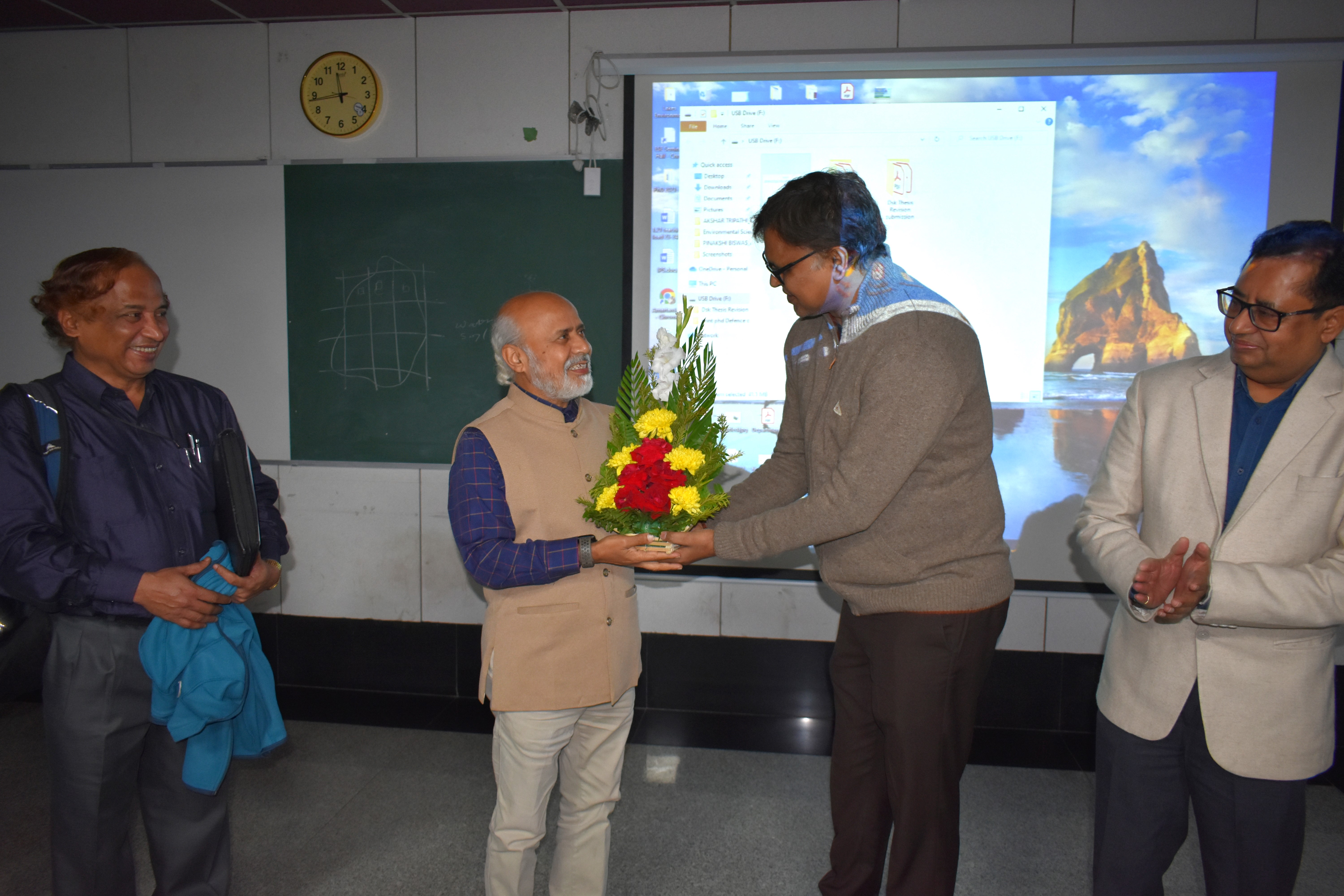 Keynote Speaker Prof. Vinod Tare welcomed by Prof. Anshumali with flower bouquet.
Keynote Speaker Prof. Vinod Tare welcomed by Prof. Anshumali with flower bouquet.
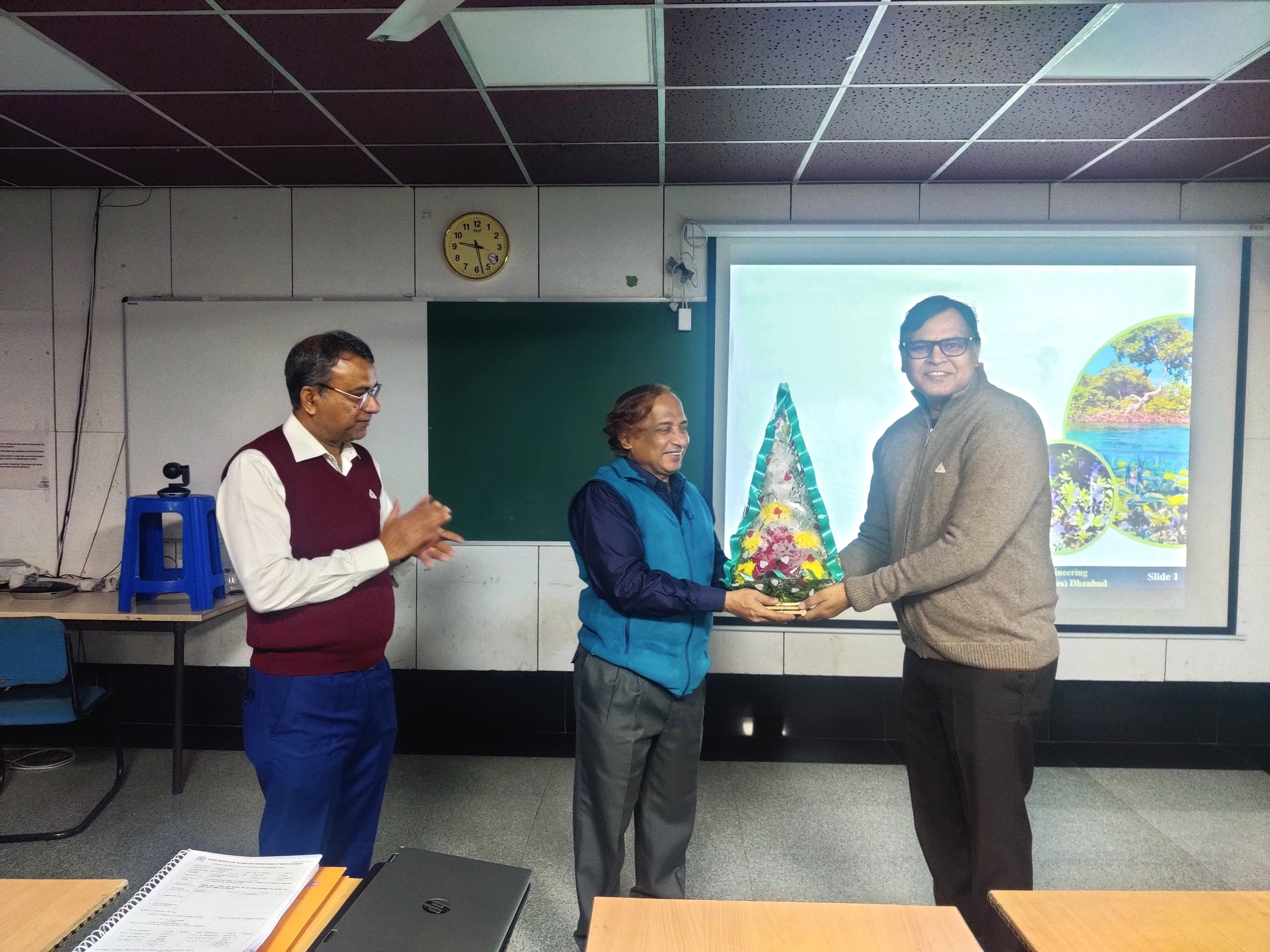 Keynote Speaker Dr. T. V. Ramachandra welcomed by Prof. Anshumali with flower bouquet.
Keynote Speaker Dr. T. V. Ramachandra welcomed by Prof. Anshumali with flower bouquet.
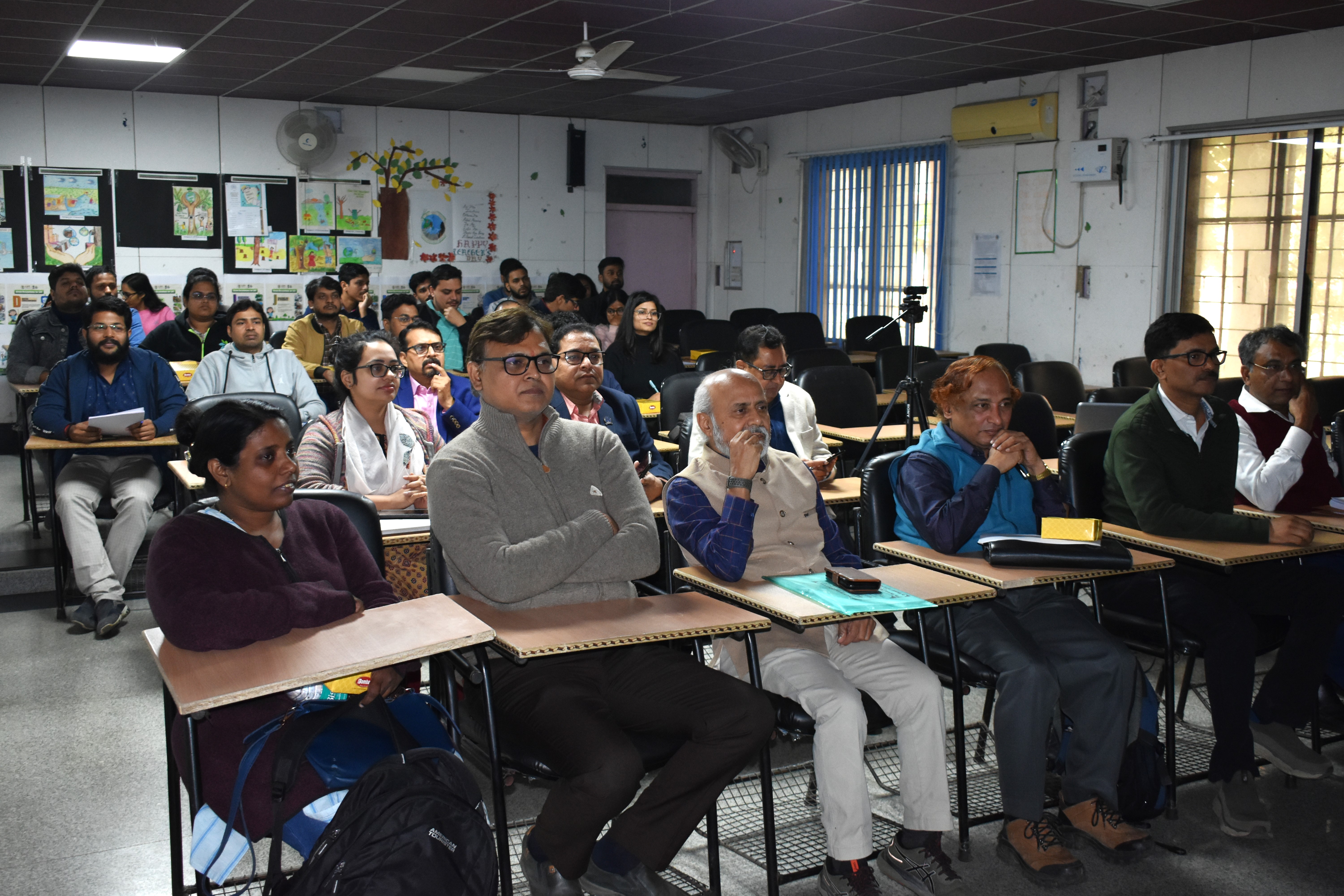 Keynote Speakers, Faculty Members, Research Scholars and Staff attending the Mission LiFE Lecture Series Programme.
Keynote Speakers, Faculty Members, Research Scholars and Staff attending the Mission LiFE Lecture Series Programme.
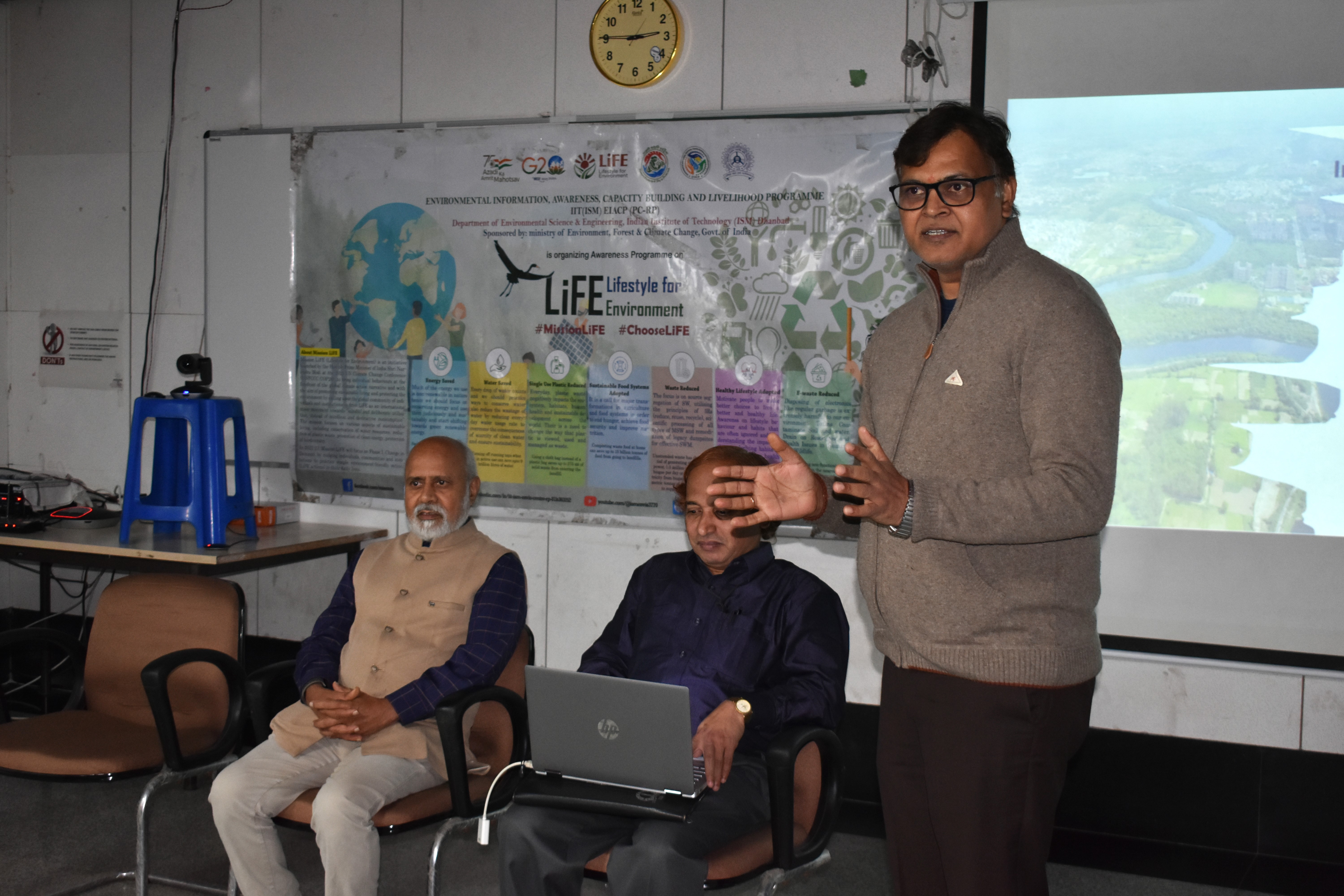 Welcome Address and a brief introduction of the invited Keynote Speakers Prof. Vinod Tare and Dr. T. V. Ramachandra delivered by Prof. Anshumali with flower bouquet.
Welcome Address and a brief introduction of the invited Keynote Speakers Prof. Vinod Tare and Dr. T. V. Ramachandra delivered by Prof. Anshumali with flower bouquet.
Prof. Vinod Tare, Founding Head – cGanga, Centre for Ganga River Basin Management and Studies, Department of Civil Engineering, IIT Kanpur delivered a keynote lecture on the topic "Playing with Water and Soil for Life and Business".
Faculty Members, Research Scolars, Students and Staff attending the Mission LiFE Lecture Series.
Dr. T.V. Ramachandra, Coordinator of Energy and Wetlands Research Group (EWRG) and Convener of EIACP (PC-RP) at Centre for Ecological Sciences (CES), IISc Bangalore delivered a keynote lecture on the topic “Western Ghats Spatial Decision Support System for LiFE".
Prof. Anshumali, Head, Dept. of ESE and coordinator, EIACP (PC-RP), IIT(ISM) Dhanbad delivered a keynote lecture on the topic "Delineation of Administrative Boundary of Rivers: An Implication in Restoration and Conservation of River Basins".
Faculty Members, Research Scolars, Students and Staff attending the Mission LiFE Lecture Series.
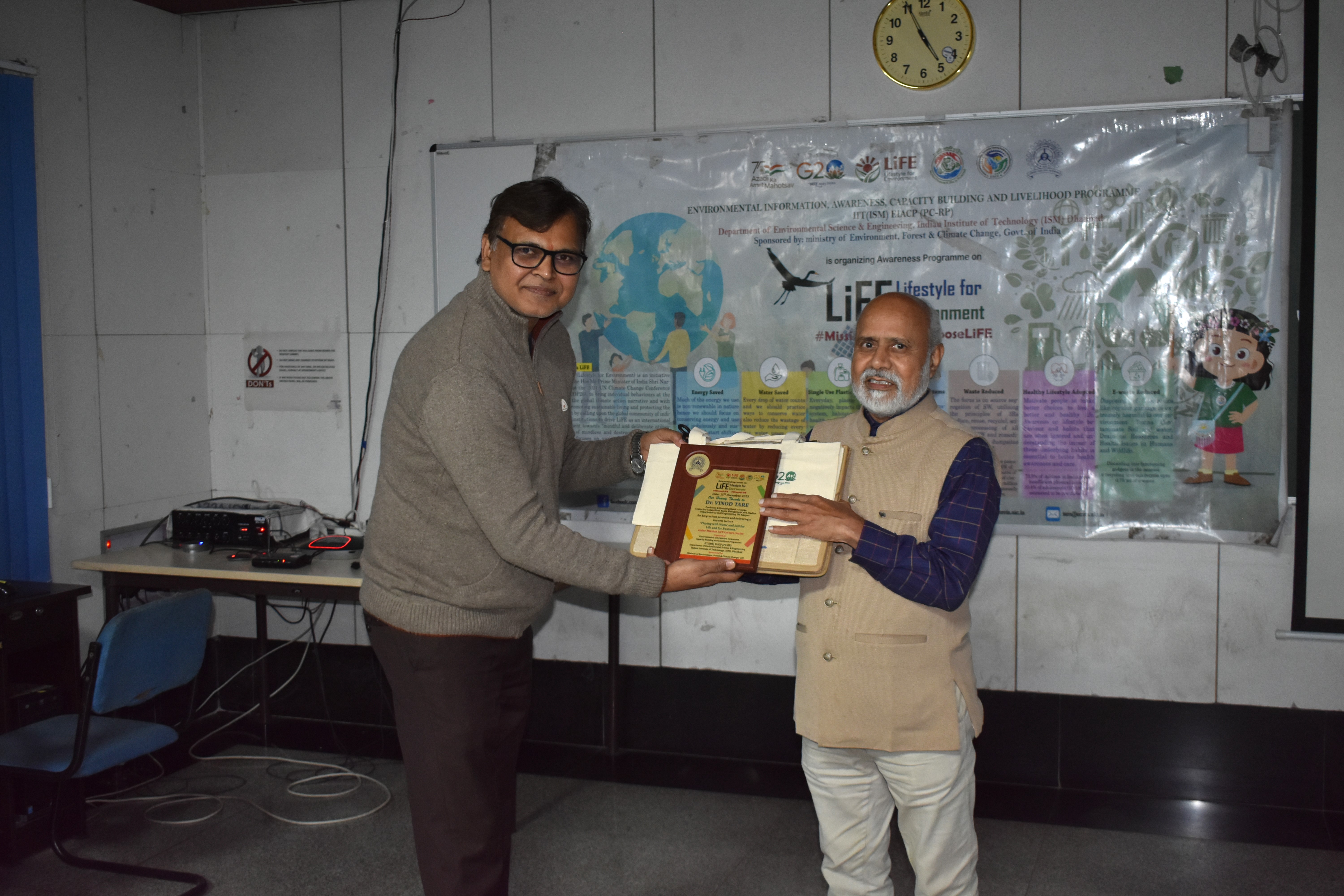 Keynote Speaker Prof. Vinod Tare felicitated with Shawl, Memento and Mission LiFE Cotton/Jute bag by Prof. Anshumali.
Keynote Speaker Prof. Vinod Tare felicitated with Shawl, Memento and Mission LiFE Cotton/Jute bag by Prof. Anshumali.
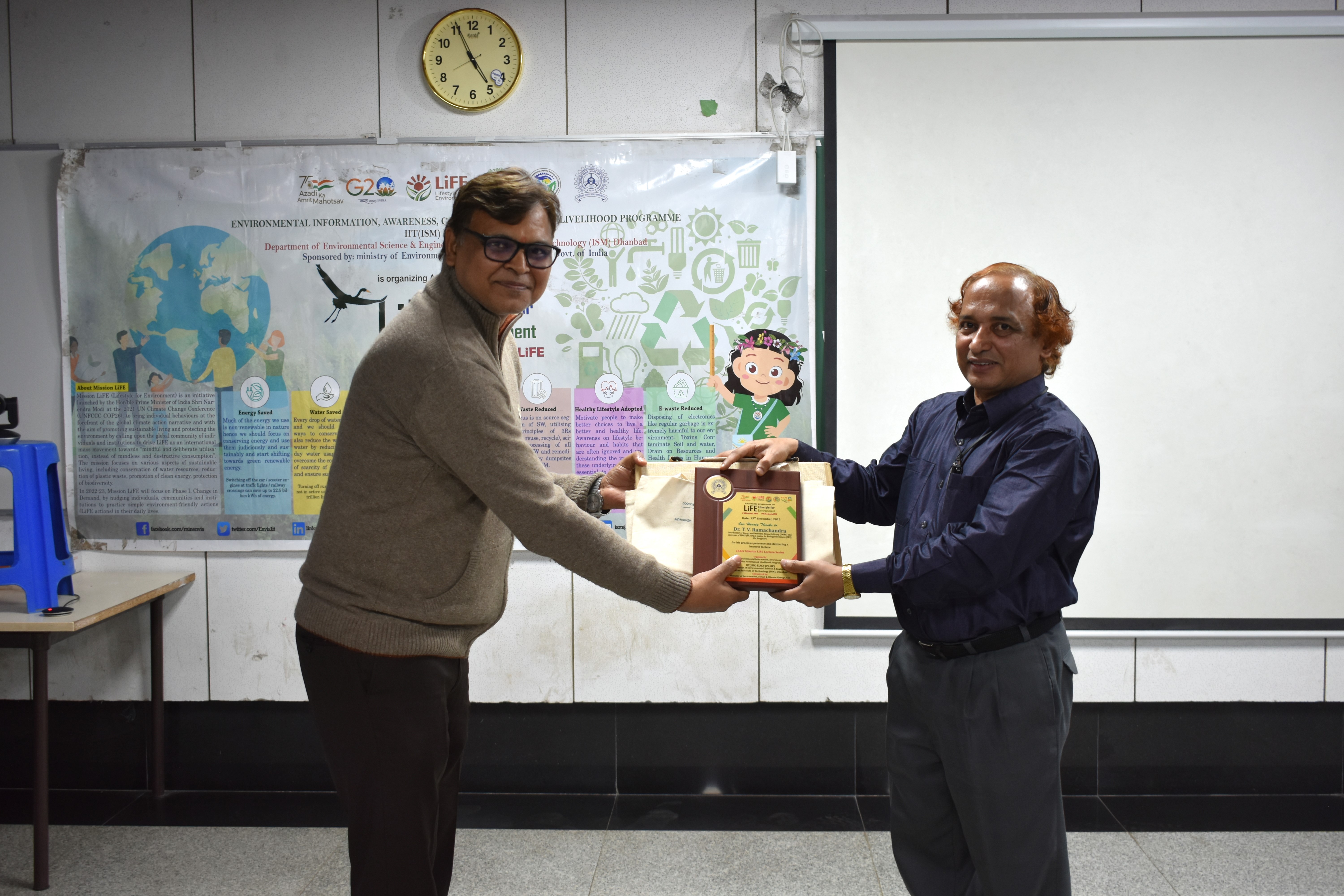 Keynote Speaker Dr. T. V. Ramachandra felicitated with Shawl, Memento and Mission LiFE Cotton/Jute bag by Prof. Anshumali.
Keynote Speaker Dr. T. V. Ramachandra felicitated with Shawl, Memento and Mission LiFE Cotton/Jute bag by Prof. Anshumali.
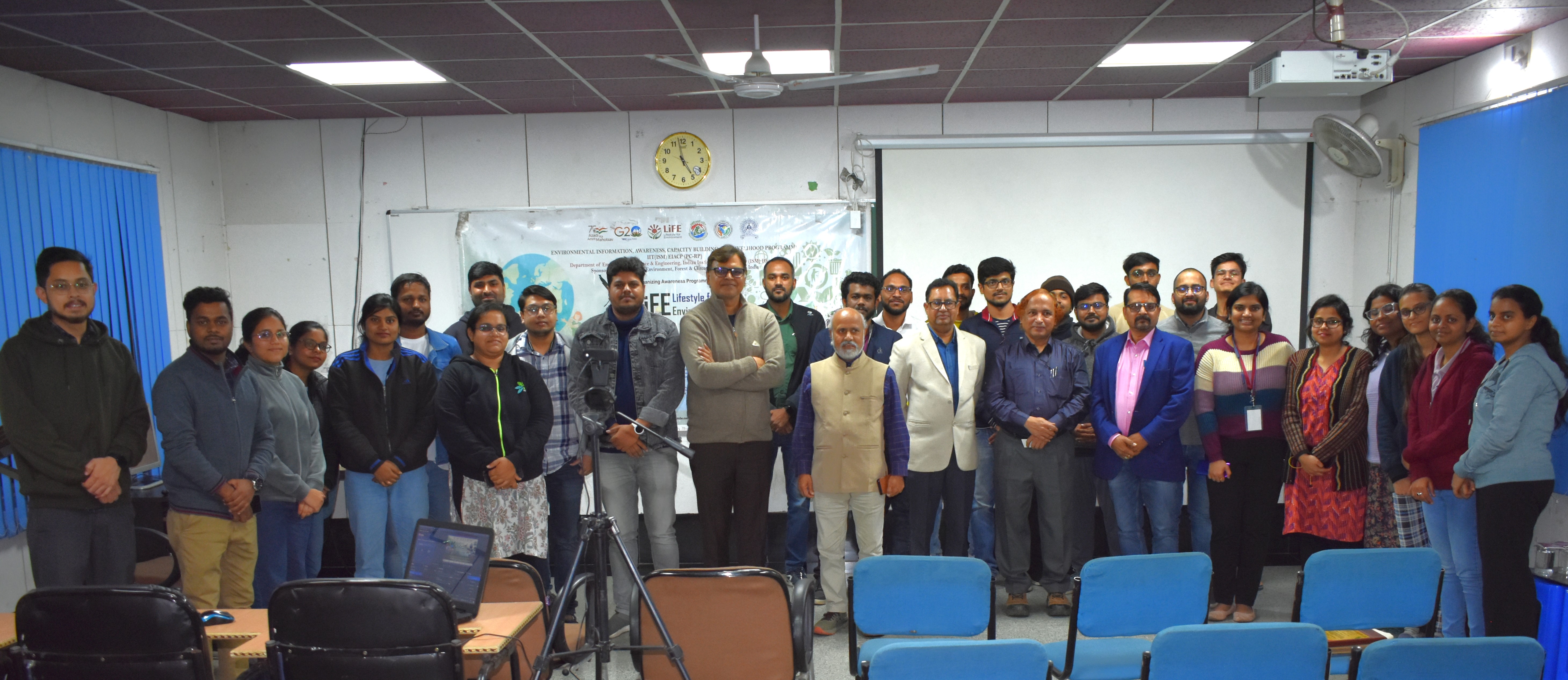
Group Photo